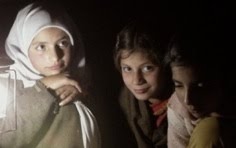 I love stories. I love hearing them, I love reading them, and mostly I love telling them.
I love stories. I love hearing them, I love reading them, and mostly I love telling them.Stories and story-tellers have been among the most powerful influences in my life, and these days I feel privileged and blessed to claim my place in the long line of tellers who have gone before, and those tellers yet to come.
I feel incredibly blessed to have my story-telling great-grandmother, Rattanbai, around when I was a little girl. Rattanbai came from a Parsi family from Gujarat. Married to my Protestant great-grandfather Basil, she took on the name Ruth, and added Bible stories to her vast repertoire of Hindu and Zoroastrian stories and myths. These daily ‘tellings’ were interspersed with European fairy-tales. I thought the different stories all came from the same book Little wonder then, that I accorded them equal sanctity with the more scriptural stories she told us!
These days I like it very much that I can share with the groups I work with from my large collection of teaching stories from cultures and traditions from around the world. I work with many different kinds of groups – corporate groups, educational institutions, women’s circles, religious orders, therapy groups, dream-work groups, book study groups, student groups. Every one of these takes to story and learns from story.
People of all ages and from all walks of life have participated in my Story-related workshops: Storywork and Healing, Psyche’s Journey and Soaking in Story.
I have put together a few of my favorite Teaching Stories from all over the world in the book Uniting Heaven and Earth: The Transformative Power of Stories. This small collection came out of the many requests for “More”, when the workshop time and space limited us to just one or two stories. They are primarily for gentle reflection, and so this is a deliberately small collection. I like to call these Life Stories, because they are about life-lessons for each of us, and because they tell of each of our lives though they seem to tell of people far, far away.
One of the oldest books on story that I have read and continue to re-read is Ruth Sawyer’s ‘The Way of The Storyteller’, written in 1942. She writes: “I have been writing this book for a long time ... Now I believe it is the easiest thing in the world to tell a story, and the hardest to be a fine storyteller.”
While I find this to be so true, I have also learnt that any telling - if it includes an invitation to the listener to go deeper into self-exploration - can yield powerful learning and meanings. This is because mostly, the teller doesn’t need to ‘make a point’; it is the story that encourages reflection in the listener/hearer, who figures out relevant learnings for herself or himself.
The old way of asking children: “So what is the moral of this story..?” can often be so limiting, so freezing, so unhelpfully there-is-only-one-right-answer oriented, and often so constricting in the development of creativity and insightfulness.
Traditional story-tellers claim that there are seven levels to any story. As we become increasingly prepared to receive their deeper meanings by ‘soaking ourselves’ in them, they will unfold new perceptions. You can come back to each story again and again, at different times, and each time the interchange will give you something new.
May you bless each story you choose to work with, and be blessed by it in turn. And with every telling, may you remember and acknowledge the lineage of known and unknown tellers who have been caretakers of the wisdom and have conveyed this gift to you.
Many of the posts here have been published before – in shorter versions – from my work as columnist for the U.P.I.’s (United Press International) Religion & Spirituality Forum, and for The Speaking Tree of the Times of India, both of which showed me, from the many people that wrote in to me, the keen interest people the world over have in the Gift of Story.
May story bless and color your life,
Marguerite Theophil
Needing stories
… Sometimes we need a story more than food in order to live. They tell us about who we are, what is possible for us,
what we might call upon. They also remind us we're not alone with whatever faces us
and there are resources both within us and in the larger world
and in the unseen world that may be cooperating with us
in our struggle to find a way to deal with challenges.
~ Rachel Naomi Remen
